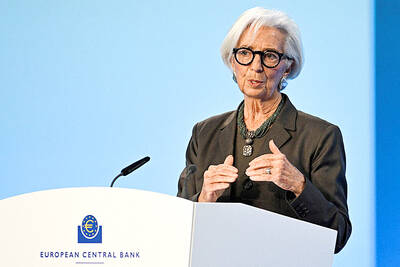The State Bank of India and Amundi Asset Management plan to offload a combined 10 percent stake in their Indian mutual fund joint venture, extending a record year for initial public offerings (IPOs) in the South Asian nation.
The State Bank of India, the country’s largest lender, aims to sell a 6 percent stake in SBI Funds Management Pvt, while Amundi intends to sell 4 percent, the firms said in separate filings yesterday.
The IPO would seek to raise about US$1 billion, according to people with knowledge of the matter, unchanged from when Bloomberg News had first reported the planned transaction in February.
With more than 6 trillion rupees (US$79 billion) of assets at the end of September, SBI Funds is India’s biggest asset manager and reports the highest profit among the State Bank of India’s unlisted units.
This year, Indian firms have raised more than US$15 billion through IPOs, a record for the nation that has seen its main stock index rally 20 percent in one of Asia’s best performances.
The State Bank of India owns 63 percent of SBI Funds, and Amundi holds the rest. The listing might happen early in the next financial year starting in April, the people said on condition of anonymity.
“The IPO would be achieved on the Indian stock market in 2022,” Amundi said in its filing.
The State Bank of India and SBI Funds did not respond to e-mails seeking comment.
The mutual fund’s IPO process was delayed by a COVID-19 wave that struck India in March.

European Central Bank (ECB) President Christine Lagarde is expected to step down from her role before her eight-year term ends in October next year, the Financial Times reported. Lagarde wants to leave before the French presidential election in April next year, which would allow French President Emmanuel Macron and German Chancellor Friedrich Merz to find her replacement together, the report said, citing an unidentified person familiar with her thoughts on the matter. It is not clear yet when she might exit, the report said. “President Lagarde is totally focused on her mission and has not taken any decision regarding the end of

French President Emmanuel Macron told a global artificial intelligence (AI) summit in India yesterday he was determined to ensure safe oversight of the fast-evolving technology. The EU has led the way for global regulation with its Artificial Intelligence Act, which was adopted in 2024 and is coming into force in phases. “We are determined to continue to shape the rules of the game... with our allies such as India,” Macron said in New Delhi. “Europe is not blindly focused on regulation — Europe is a space for innovation and investment, but it is a safe space.” The AI Impact Summit is the fourth

CONFUSION: Taiwan, Japan and other big exporters are cautiously monitoring the situation, while analysts said more Trump responses ate likely after his loss in court US trading partners in Asia started weighing fresh uncertainties yesterday after President Donald Trump vowed to impose a new tariff on imports, hours after the Supreme Court struck down many of the sweeping levies he used to launch a global trade war. The court’s ruling invalidated a number of tariffs that the Trump administration had imposed on Asian export powerhouses from China and South Korea to Japan and Taiwan, the world’s largest chip maker and a key player in tech supply chains. Within hours, Trump said he would impose a new 10 percent duty on US imports from all countries starting on

STRATEGIC ALLIANCE: The initiative is aimed at protecting semiconductor supply chain resilience to reduce dependence on China-dominated manufacturing hubs India yesterday joined a US-led initiative to strengthen technology cooperation among strategic allies in a move that underscores the nations’ warming ties after a brief strain over New Delhi’s unabated purchase of discounted Russian oil. The decision aligns India closely with Washington’s efforts to build secure supply chains for semiconductors, advanced manufacturing and critical technologies at a time when geopolitical competition with China is intensifying. It also signals a reset in relations following friction over energy trade and tariffs. Nations that have joined the Pax Silica framework include Japan, South Korea, the UK and Israel. “Pax Silica will be a group of nations